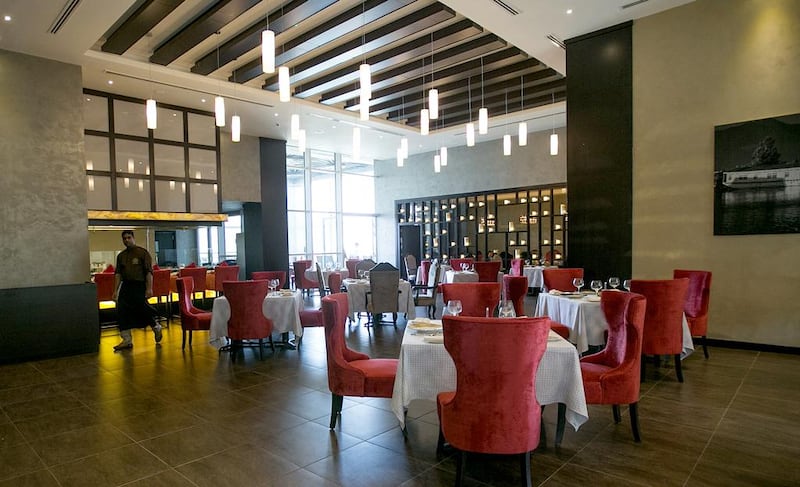The wait is over. The very popular Indian chef Sanjeev Kapoor has finally opened his first restaurant in Abu Dhabi. Signature by Sanjeev Kapoor is now welcoming discerning diners to its upscale location in the Nation Galleria on the Corniche. Kapoor, who already has three restaurants in Dubai, tells The National that Signature's food is "art on a plate".
The Abu Dhabi effect
“Abu Dhabi is a cosmopolitan, modern city,” says Kapoor. “People here really enjoy their food. There was a need to create an exclusive dining experience. Bringing Signature here was the perfect solution.”
The restaurant will offer a variety of experiences, including a range of select fare and experiential dining in the form of a new-age lounge offering specially created Indian delicacies.
Situated on the first floor of the Nation Galleria Mall, Signature Abu Dhabi is spread over 8,000 square feet. The restaurant is awash in red and chocolate decor – it’s an inviting, sophisticated venue. There are three private dining rooms along one wall that each seat six. A larger private room (with glass walls) can seat up to 20 guests.
There are nine tables on the terrace and, though it is an indoor terrace, the floor-to-ceiling windows give diners a stunning view of both the Corniche and the city. “It’s all about setting up an exciting fine dining experience,” explains Kapoor. “A live chef’s table and food of the finest quality served with a twist will be at the core of the restaurant’s ethos.”
Home in the UAE
“The UAE, especially Dubai, has been like my second home,” says the chef. Khazana, his first Dubai restaurant, was launched in 1998.
“It’s been more than 15 years and it still looks the same, but the food rules. People love the ambience and so we’ve kept it untouched. But now, we will be creating a new space there for which I’ll be visiting Dubai again soon.”
People in the UAE love food and are ready to experiment and try new things, says Kapoor. “This spurred me to open four restaurants here. The last three came about only because of the people who liked and enjoyed the dining experience at Khazana. Now, with Signature opening in Abu Dhabi, I think there is scope for more.”
The master chef
Kapoor did a stint on MasterChef India, sharing his expertise with young cooking enthusiasts.
“I was approached by Star TV India for MasterChef India season 3 [2013]. I had been approached by them for the earlier seasons, too, but I couldn’t make a commitment then as I was busy with my channel, FoodFood. But, this time when they persisted, I had no reason to stay away.” He says the fellow chef judges on the show, Vikas Khanna and Kunal Kapoor, made for a “great gang. The best, funniest times were when any two of us ganged up on the third.”
Complementary cuisines
But just how does Indian cuisine fit into the Middle Eastern palate?
“I believe Indian and Middle Eastern cuisines are complementary,” says Kapoor. “This is not only because there are a lot of Indians who have migrated to Middle Eastern countries, but because of old trade routes, through which spices were exported.
“To tell you the truth, I am really fond of Middle Eastern cuisine, and if I had to pick my favourites, it would have to be falafel and tabbouleh. As far as Indian cuisine goes, my favourite of all time is simple, yet absolute lovely, home-made rajma and chawal [kidney beans and rice] and kadhi and chawal [gram flour curry and rice]. To me, this is food for the soul – simple, filling and delicious.”
Sanjeev Kapoor's special Kadai prawns with roasted pepper jam recipe
Serves 4. The pepper jam can be prepared in advance.
Ingredients
400g large prawns, peeled and deveined
4 dried red chillies, broken into bits
1 tsp coriander seeds
2 tbsp lemon juice
Sea salt to taste
3 tbsp cooking oil
1 tsp carom seeds
1 medium onion, chopped
1 tsp ginger paste
1 tsp garlic paste
2 green chillies, chopped
½ tsp roasted and crushed dried fenugreek leaves
¾ cup roasted pepper jam
½ tsp garam masala powder
2 tbsp chopped fresh coriander
For roasted pepper jam
4 medium red peppers, quartered
2 medium tomatoes, seeded and quartered
1 tsp cooking oil
3 to 4 garlic cloves, chopped
3 tbsp apple cider vinegar
2 tbsp brown sugar
2 tsp red chilli flakes
Salt to taste
Method
• To make roasted pepper jam, preheat oven to 180°C/350°F/gas mark 4.
• Arrange peppers and tomatoes on a baking tray and sprinkle with salt. Bake for 20 to 25 minutes and set aside to cool. When cooled, peel the capsicums and tomatoes and purée them in a blender.
• Heat the oil in a non-stick pan, add garlic and sauté for 30 seconds. Add the capsicum-tomato purée and salt, and cook for two minutes. Add vinegar and bring to a boil. Lower the heat and add the brown sugar and chilli flakes. Cook until reduced by half. Remove from heat and set aside.
• To make the Kadai prawns, dry roast the red chillies and coriander seeds. Cool and grind coarsely with sea salt. Marinate the prawns in a mixture of this powder and lemon juice for 15 minutes.
• Heat the oil in a pan and add the carom seeds. When they begin to change colour, add onion and green chillies. Sauté until golden brown. Add the ginger paste, garlic paste and sauté for 30 seconds.
• Add the marinated prawns and stir-fry for a few minutes. Add the fenugreek leaves, garam masala powder and salt to taste. Mix well. Stir in half the roasted pepper jam and mix until the prawns are coated well. Add one-quarter cup water and cook until the prawns are just done. Add the coriander leaves and mix. Serve immediately.
With additional reporting by Stacie Overton Johnson
[ artslife@thenational.ae ]











